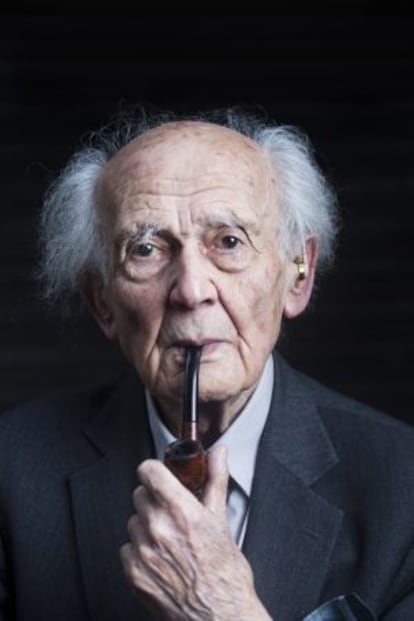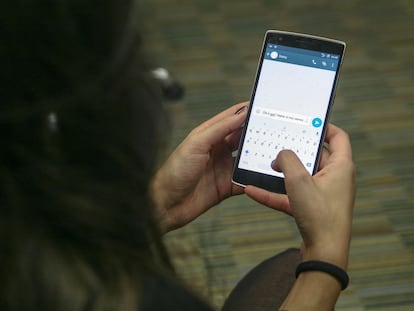Zygmunt Bauman: ¡°Social media are a trap¡±
The Polish-born sociologist is skeptical about the possibilities for political change
Zygmunt Bauman has just celebrated his 90th birthday and taken two flights from his home in the northern British city of Leeds to get to an event in Burgos, northern Spain. He admits to being tired as we begin the interview, but he still manages to express his ideas calmly and clearly, taking his time with each response because he hates giving simple answers to complex questions. Since developing his theory of liquid modernity in the late 1990s ¨C which describes our age as one in which ¡°all agreements are temporary, fleeting, and valid only until further notice¡± ¨C he has become a leading figure in the field of sociology. His work on inequality and his critique of what he sees as the failure of politics to meet people¡¯s expectations, along with a highly pessimistic view of the future of society, have been picked up by the so-called May 15 ¡°Indignant¡± movement in Spain ¨C although he has repeatedly highlighted its weaknesses.
¡°We¡¯re still in the age of Versailles, when the principle of each nation¡¯s right to self rule was established. But that¡¯s a fiction in today¡¯s world¡±
Born in Poland in 1925,?Bauman¡¯s parents fled to the Soviet Union following the German invasion in 1939. In 1968, after he was stripped of his post as a teacher and expelled from the Communist Party along with thousands of other Jews in the wake of the Six-Day War, he left for the United Kingdom, taking up a post at Leeds University where he is now Emeritus Professor of Sociology. His work has been awarded numerous international prizes, among them Spain¡¯s Prince of Asturias Award, in 2010.
He has outlined his pessimistic world view in books such as 2014¡¯s Does the Richness of the Few Benefit Us All?, which argues that the world is paying a high price for the neoliberal revolution that began in the 1980s and that wealth has not trickled down to the rest of society. In Moral Blindness, published last year, he and co-author Leonidas Donskis warn about the loss of community in our increasingly individualistic world.
QUESTION. You have described inequality as a ¡°metastasis.¡± Is democracy under threat?
ANSWER. We could describe what is going on at the moment as a crisis of democracy, the collapse of trust: the belief that our leaders are not just corrupt or stupid, but inept. Action requires power, to be able to do things, and we need politics, which is the ability to decide what needs to be done. But that marriage between power and politics in the hands of the nation state has ended. Power has been globalized, but politics is as local as before. Politics has had its hands cut off. People no longer believe in the democratic system because it doesn¡¯t keep its promises. We see this, for example, with the migration crisis: it¡¯s a global phenomenon, but we still act parochially. Our democratic institutions were not designed for dealing with situations of interdependence. The current crisis of democracy is a crisis of democratic institutions.

Q. In which direction is the pendulum that you describe between freedom and security swinging at the moment?
A. These are two values that are tremendously difficult to reconcile. If you want more security, you¡¯re going to have to give up a certain amount of freedom; if you want more freedom, you¡¯re going to have to give up security. This dilemma is going to continue forever. Forty years ago we believed that freedom had triumphed and we began an orgy of consumerism. Everything seemed possible by borrowing money: cars, homes¡ and you just paid for it later. The wakeup call in 2008 was a bitter one, when the loans dried up. The catastrophe, the social collapse that followed hit the middle classes particularly hard, dragging them into a precarious situation where they remain: they don¡¯t know if their company is going to merge with another and they will be laid off, they don¡¯t know if what they have bought really belongs to them¡ Conflict is no longer between classes, but between each person and society. It isn¡¯t just a lack of security, but a lack of freedom.
Q. You say that progress is a myth, because people no longer believe the future will be better than the past.
A. We are in a period of interregnum, between a time when we had certainties and another when the old ways of doing things no longer work. We don¡¯t know what is going to replace this. We are experimenting with new ways of doing things. Spain tried questioning things through the May 15 (15M) movement, when people took over public spaces, arguing, trying to replace parliamentary procedures with a kind of direct democracy. This hasn¡¯t lasted long. Austerity policies will continue, nobody could stop them, but they could still be relatively effective in finding new ways to do things.
Q. You have argued that the likes of 15M and the global Occupy movement know ¡°how to clear the way, but not how to create something solid.¡±
A. People set aside their differences for a while in the public squares for a common goal. If that goal is negative, about getting angry with someone, there is more chance of success. In a way it could have been an explosion of solidarity, but explosions are very powerful and short-lived.
¡°Most people use social media not to open their horizons wider, but to lock themselves in a comfort zone¡±
Q. You also believe that by their nature, there is no room for leadership in rainbow coalitions.
A. It is precisely because such movements lack leaders that they can survive, but it is also precisely because they lack leaders that they cannot convert their sense of purpose into action.
Q. In Spain, the 15M movement has helped create new political forces.
A. Changing one party for another will not solve the problem. The problem is not that the parties are wrong, but that they don¡¯t control things. Spain¡¯s problems are part of a global problem. It¡¯s a mistake to think you can solve things internally.
Q. What do you think about the Catalan independence project?
A. I think we¡¯re still following the principles of Versailles, when the idea of each nation¡¯s right to self rule was established. But that¡¯s a fiction in today¡¯s world, when there are no more homogeneous territories. Today, every society is just a collection of diasporas. People join the societies to which they are loyal and pay their taxes, but at the same time, they do not want to give up their identity. The connection between where you live and identity has been broken. The situation in Catalonia, as in Scotland or Lombardy, is a contradiction between tribal identity and citizenship. They are Europeans, but they don¡¯t want to talk to Brussels via Madrid, but via Barcelona. The same logic is emerging in almost every country. We are still following the same principles established at the end of World War I, but there have been many changes in the world.
¡°Our democratic institutions were not designed for dealing with situations of interdependence¡±
Q. You are skeptical of the way people protest through social media, of so-called ¡°armchair activism,¡± and say that the internet is dumbing us down with cheap entertainment. So would you say that the social networks are the new opium of the people?
A. The question of identity has changed from being something you are born with to a task: you have to create your own community. But communities aren¡¯t created, and you either have one or you don¡¯t. What the social networks can create is a substitute. The difference between a community and a network is that you belong to a community, but a network belongs to you. You feel in control. You can add friends if you wish, you can delete them if you wish. You are in control of the important people to whom you relate. People feel a little better as a result, because loneliness, abandonment, is the great fear in our individualist age. But it¡¯s so easy to add or remove friends on the internet that people fail to learn the real social skills, which you need when you go to the street, when you go to your workplace, where you find lots of people who you need to enter into sensible interaction with. Pope Francis, who is a great man, gave his first interview after being elected to Eugenio Scalfari, an Italian journalist who is also a self-proclaimed atheist. It was a sign: real dialogue isn¡¯t about talking to people who believe the same things as you. Social media don¡¯t teach us to dialogue because it is so easy to avoid controversy¡ But most people use social media not to unite, not to open their horizons wider, but on the contrary, to cut themselves a comfort zone where the only sounds they hear are the echoes of their own voice, where the only things they see are the reflections of their own face. Social media are very useful, they provide pleasure, but they are a trap.
Tu suscripci¨®n se est¨¢ usando en otro dispositivo
?Quieres a?adir otro usuario a tu suscripci¨®n?
Si contin¨²as leyendo en este dispositivo, no se podr¨¢ leer en el otro.
FlechaTu suscripci¨®n se est¨¢ usando en otro dispositivo y solo puedes acceder a EL PA?S desde un dispositivo a la vez.
Si quieres compartir tu cuenta, cambia tu suscripci¨®n a la modalidad Premium, as¨ª podr¨¢s a?adir otro usuario. Cada uno acceder¨¢ con su propia cuenta de email, lo que os permitir¨¢ personalizar vuestra experiencia en EL PA?S.
?Tienes una suscripci¨®n de empresa? Accede aqu¨ª para contratar m¨¢s cuentas.
En el caso de no saber qui¨¦n est¨¢ usando tu cuenta, te recomendamos cambiar tu contrase?a aqu¨ª.
Si decides continuar compartiendo tu cuenta, este mensaje se mostrar¨¢ en tu dispositivo y en el de la otra persona que est¨¢ usando tu cuenta de forma indefinida, afectando a tu experiencia de lectura. Puedes consultar aqu¨ª los t¨¦rminos y condiciones de la suscripci¨®n digital.












































